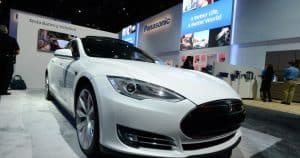Dive Brief:
- Panasonic will build a $4 billion battery production facility in De Soto, Kansas, as it looks to expand capacity to meet rising electric vehicle demand, the company jointly announced with Kansas Governor Laura Kelly this week.
- The proposed lithium-ion battery manufacturing facility outside Kansas City will expand Panasonic’s U.S. EV-production capacity. The company has so far shipped more than six billion EV battery cells out of its current operation in Nevada.
- “With the increased electrification of the automotive market, expanding battery production in the US is critical to help meet demand,” said Kazuo Tadanobu, president and CEO of Panasonic Energy.
Dive Insight:
Panasonic is doubling down on battery production as sales of electric vehicles continue to rise, dominated by its customer Tesla. Electric vehicle sales reached a record high in Q2, rising 13% over the previous quarter according to consulting firm Cox Automotive, with Tesla making up 66% of the segment.
To help meet that demand, Panasonic has been working to grow its production capacity on multiple fronts. The company published plans in April to invest 400 billion yen (approximately $2.9 billion) in “growth areas” including automotive batteries and supply chain software, according to company statements.
In December, Panasonic Energy of North America announced plans to build a production campus in Reno, Nevada, adding to the existing production it has at Tesla’s Gigafactory 1 site in Sparks, Nevada. Panasonic has faced pressure from Tesla, which has asked the company to expedite battery production, Bloomberg reported.
EV battery production is heating up across the country. For example, LG Energy Solutions announced two facility plans this year to up capacity, including the announcement of a third battery cell manufacturing plant with GM in Michigan, as well as a battery factory in Arizona.
At least 13 EV battery manufacturing sites are slated to open in the U.S. in the coming years as of last December, with sites on the way from the likes of Ford, Stellantis and Volkswagen, according to the U.S. Department of Energy. Locations are largely concentrated in the Midwest and the South.
New government funding has also helped with the production push. In May, the Biden administration made $3.1 billion in battery and component manufacturing, recycling and second-life incentives available through the Department of Energy. The Panasonic project, expected to create an estimated 4,000 jobs, received incentives through Kansas’ Attracting Powerful Economic Expansion program.
“Kansas has an impressive history of being home to a skilled manufacturing workforce,” said Kris Takamoto, executive vice president of Panasonic Energy and head of EV Battery Business. “We appreciate Kansas’s dedication to sustainability and its commitment to and growth in the clean and renewable energy space.”

